|
|
|
Sort Order |
|
|
|
Items / Page
|
|
|
|
|
|
|
| Srl | Item |
| 1 |
ID:
174514
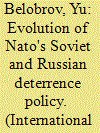

|
|
|
|
|
| Summary/Abstract |
IN 2019, the NATO countries celebrated the 70th anniversary of their military alliance with great fanfare. A common theme of the anniversary celebrations and NATO leaders' related public statements, as well as the London Declaration that the leaders of the NATO countries adopted at a meeting in London on December 3-4, 2019, is the idea that NATO is indispensable to maintaining security in the Euro-Atlantic region and the world as a whole, and that the policy of resolutely deterring Russia must continue. Even though the wording of the bloc's strategy has changed as the international situation and relations with the USSR/Russia change, that key element has remained a constant, fundamental principle of all seven strategic concepts and other basic documents of the alliance throughout its entire existence.
|
|
|
|
|
|
|
|
|
|
|
|
|
|
|
|
| 2 |
ID:
098897


|
|
|
| 3 |
ID:
133044
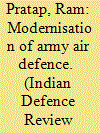

|
|
|
|
|
| Publication |
2014.
|
| Summary/Abstract |
As threats from the air play a decisive role in war, there will always be a need to protect the vital static assets as well as retain the freedom to manoeuvre mobile combat forces with no or minimum interference from the skies. The onus lies on the Army Air Defence to overcome the increasing challenges from the air with the enemy using sound strategic/tactical concept and efficient AD weapon systems. An effective AD system is thus a force multiplier for all the combat forces giving them the freedom to carry out operational tasks optimally,
|
|
|
|
|
|
|
|
|
|
|
|
|
|
|
|
| 4 |
ID:
109961
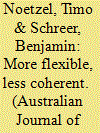

|
|
|
|
|
| Publication |
2012.
|
| Summary/Abstract |
At its 2010 Lisbon summit, the North Atlantic Treaty Organization (NATO) took significant steps towards becoming a modern alliance. In the face of a changing security environment and divergent strategic interests among 28 members, NATO adapted its strategic concept and reformed its way of formulating strategy. The new strategic concept advances conflict management as a core task for the alliance. In combination with a greater emphasis on developing partnerships, NATO conceptually strengthened its profile as a global security actor. The summit also reflected a new approach to formulating NATO strategy by providing the Secretary General Anders Fogh Rasmussen with a strong role in setting the strategic agenda. Indeed, he assumed a more supranational function rather than acting as a representative of all allies. But as the Libya operation demonstrates, NATO will struggle to maintain cohesion in an increasingly 'polycentric' alliance. While the focus on conflict management will make the alliance more flexible, it will also become a less coherent global security actor.
|
|
|
|
|
|
|
|
|
|
|
|
|
|
|
|
| 5 |
ID:
133373
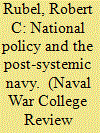

|
|
|
|
|
| Publication |
2014.
|
| Summary/Abstract |
The article discusses U.S. government policy concerning the U.S. Navy during what is called the post-systemic era. The author argues that the U.S. Navy requires recapitalization, states that the U.S. Navy must craft a clear strategic concept to convince the U.S. public that it should receive continued funding, and discusses the constitutional role of the U.S. Navy. The article discusses former U.S. secretary of the treasury Alexander Hamilton, scholar Alfred Thayer Mahan, and the U.S. Navy during the Cold War.
|
|
|
|
|
|
|
|
|
|
|
|
|
|
|
|
| 6 |
ID:
184986
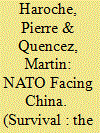

|
|
|
|
|
| Summary/Abstract |
This article explores and assesses NATO’s various options for dealing with Chinese power. Firstly, in terms of military approaches, we argue that NATO is unlikely to play a substantial role in US-led efforts to balance China in the Indo-Pacific region, or to designate China as a ‘threat’ in the North Atlantic area. Given that a clear-cut geographic division of labour between the United States and European partners would weaken the Alliance’s cohesion, NATO should instead focus on better integrating the ‘China factor’ into its military planning, in anticipation of the knock-on effects that a crisis in Asia could have on the European theatre. Secondly, in terms of the political approaches, although a formal expansion of NATO’s competencies is unlikely, stronger coordination with Indo-Pacific actors and with the European Commission could help overcome many of the Alliance’s geographic and functional limitations in dealing with China.
|
|
|
|
|
|
|
|
|
|
|
|
|
|
|
|
| 7 |
ID:
186541


|
|
|
|
|
| Summary/Abstract |
National resilience, defined by NATO as a state’s ability to “resist and recover from a major shock such as a natural disaster, failure of critical infrastructure, or a hybrid or armed attack” must be at the forefront of discussions over the forthcoming Strateic Concept. What emerging challenges exist to national resileince, and how could NATO continue to evolve its response to these? How should our thinking evolve on deterring hybrid action and interference in democratic systems? This paper argues for four additional new national and alliance-wide resilience efforts: (1) a new baseline requirement for the protection of democracy; (2) efforts to reduce reliance on energy assets from non-NATO members, especially Russia; (3) mitigation initiatives to reduce the risk posed by foreign investment in vital infrastructure; and (4) the development of unambiguous standards for member state resilience.
|
|
|
|
|
|
|
|
|
|
|
|
|
|
|
|
| 8 |
ID:
181192
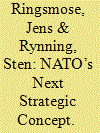

|
|
|
|
|
| Summary/Abstract |
NATO has embarked on the renewal of its Strategic Concept, the latest version of which dates to 2010. The question is whether this opportunity for renewal will result in a broad and elastic set of core tasks that have wide political appeal but that are ill suited to meet NATO’s strategic challenges. The Alliance opted for political convenience in 2010, and since then the complexity of Alliance politics has only increased. Allowing political considerations to dictate the contents of the new Strategic Concept would, however, bode ill for NATO’s ability to manage not only great-power competition but also an internal political–military divide that has become increasingly visible as NATO has adapted to Russia’s post-2014 revisionism. NATO’s next Strategic Concept should therefore put collective defence at the top of its list of priorities, reinvigorate NATO’s narrative of values, and encourage enhanced and sustained in-house political–military dialogue.
|
|
|
|
|
|
|
|
|
|
|
|
|
|
|
|
| 9 |
ID:
186545
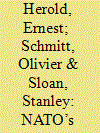

|
|
|
|
|
| Summary/Abstract |
Both China and Russia have become more assertive strategic actors since NATO last revised its Strategic Concept in 2010. What major strategic decisions do Russia, China, and other major powers face in the next decade? How should these changes be reflected in the next Strategic Concept? We argue that NATO must seriously address challenges from China and Russia through increased commitment, preparedness, and coordination of the conventional forces Allies make available. This may require a more integrated, ready, and responsive command headquarters that should be agreed by Allies with the 2022 Strategic Concept and implemented without delay.
|
|
|
|
|
|
|
|
|
|
|
|
|
|
|
|
| 10 |
ID:
137404
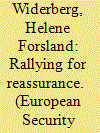

|
|
|
|
|
| Summary/Abstract |
This article examines how allies who shared the same overall goal chose different tactics. It compares how Norway, Poland, and Lithuania pursued a strengthened emphasis on collective defense in the revision of NATO's strategic concept, which was adopted in 2010. In their efforts on influence the outcome of this process, the three allies made use of both bilateral and multilateral channels, but differed in terms of rhetoric, political access, use of media, and mix of national and alliance interests. The article finds that not only size, but also different levels of alliance maturity and diplomatic skills can explain the different tactics. As the study demonstrates, these differences not only create internal dynamics in the form of learning and division of labor, but they can also affect decision-making.
|
|
|
|
|
|
|
|
|
|
|
|
|
|
|
|
| 11 |
ID:
160725


|
|
|
|
|
| Summary/Abstract |
This article explores the relevance of geography in NATO defence planning. Historical analysis of strategic concepts and other planning documents suggests a pendulum movement from treating geography as the central organising principle within the alliance, to downplaying its role in favour of functional considerations, and back. In view of mounting tensions alongside Europe’s eastern and southern flanks, this argument acquires contemporary relevance with regards to how alliance responsibilities can be (re)distributed. Rediscovering the early principle that allies should concentrate on those tasks for which they are the most geographically suited offers a promising approach for a new division of labour.
|
|
|
|
|
|
|
|
|
|
|
|
|
|
|
|
| 12 |
ID:
186546


|
|
|
|
|
| Summary/Abstract |
Since the Russian annexation of Crimea in 2014, NATO has returned to “its roots” (Pacuła 2021, 4). That reorientation has, of course, been sharpened further by the 2022 Ukraine crisis. Countering the Russian threat has once again become firmly established as NATO’s modus operandi (Schreer and Alberque 2022). For many commentators, this clarity of purpose is no bad thing. NATO had, so the argument runs, become over-stretched and ineffectual by taking on difficult missions such as that in Afghanistan where success was always ephemeral (Stapleton 2016). Better then, to concentrate on collective defense and deterrence – missions where NATO’s track-record is strong, its political-military assets well-established, and consensus clear (Ringsmose and Rynning 2021).
|
|
|
|
|
|
|
|
|
|
|
|
|
|
|
|
| 13 |
ID:
141675
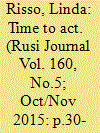

|
|
|
|
|
| Summary/Abstract |
Since 1989, NATO has expanded its strategic concept and geopolitical scope to the detriment of an efficient and well-defined military capability in Europe. However, the Ukrainian crisis has brought the attention back to Europe and to NATO's deterrent value. Linda Risso argues that, as one of the Alliance's leading members, the UK must act as a catalyst to ensure that NATO has the necessary military strength and political will to respond to the new security challenges.
|
|
|
|
|
|
|
|
|
|
|
|
|
|
|
|
|
|
|
|
|